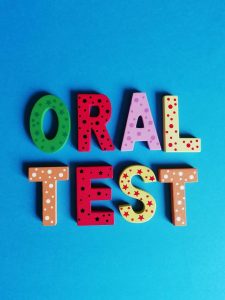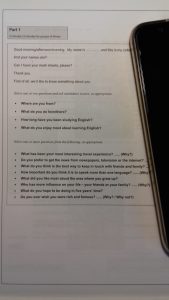
Speaking exams are tough but with the right preparation and mindset, you can step into the examination hall with a good dose of self-confidence in your abilities and a feeling of being in control of the situation rather than overwhelmed by it.
Keep reading for some ideas to help you build confidence and take away some of the anxiety so that you can perform better on exam day.
The aim of this article is to share some general advice that I give students who are candidates for B2 or C1 exams. Their level of English is up to the task but they need to learn the ropes of how to make the most of what they know and thus, be able to demonstrate their command of the language and get a better score.
Let’s face it! Doing an oral exam is regarded by most as something to dread. I am yet to meet someone who admits being looking forward to it. It is a very unnatural situation in which one is supposed to act natural. Some of the tasks take you to scenarios that are never encountered in real life, including when you are speaking your own language. Compare, contrast and speculate about two photographs in Cambridge tests is an example of that.
As a way to make things more bearable, I sometimes tell my students to try to have fun in the process. In return, of course, I get looks of disbelief and responses along the lines of “that’s easier said than done”.
Having said that, I am positive that if you prepare adequately and shift your mindset, it will be more of a walk in the park and less of a gruelling process. So, how can we get to that point of self-confidence which will ease the way and turn into a better experience and score?
To start with, if you are attending lessons and there is something you would like to do more of, let your teacher know. We are there to help you, and having a more tangible idea of what you expect from your lessons will only improve the quality time in class. But, aside from the classroom context, there are a number of strategies you can easily implement by yourself.
YOUR SOLO PRACTICE
First and foremost,
if you want to make significant progress with your oral exam prep,
take the reins and do it solo too.
1. BECOME AN EXPERT IN THE EXAM TASKS AND WHAT IS EXPECTED OF YOU
Read the exam specifications and information for candidates. Thoroughly! Even if you have dealt with this in class, and probably more than once, find the exam official website and go through it yourself. Dig into it and take notes; own it and create your guidelines.
Looking at it from your own, unique angle can give you a better understanding and a more personalised and natural approach to the way you handle it.
You can then share your learning with your teacher or a friend, and this will, once again, help you internalise it. There is no better way to understand something than knowing you will have to explain it.
2. REHEARSE EXTENSIVELY BUT DO NOT MEMORISE
It may sound obvious, but practice makes perfect. There are techniques you have to acquire, skills that take practice to be mastered. Put in the hours until it all becomes second nature. And do so in different ways: with a teacher, a classmate, a friend, and last but not least, by yourself.
At this point in the procedures, I take it for granted that you have read the exam specifications in detail so you know exactly what you are doing. And very importantly, that you are at the right level in general terms but as yet, lacking confidence in speaking.
So, how do you go about self-study when the study material is “speaking”?.
You surely need someone to listen and correct, right? That is a common belief. But, there are ways around it; systems you can put in place to move forward with your speaking exam preparation without the need of a listener.
So, here is the situation: you are at home, relaxed, no pressure, I am not sure that is what we are after. To make it work better, you need to add an element of pressure, don’t you think?. Something that can replicate the figure of the examiner or the teacher sitting in front of you.
A recording device! That can do the trick. And we are in luck as nowadays this is at the tip of your hands. All you need is your smartphone.
Decidedly, having your voice recorded tends to be a bit awkward at first. Put negative thoughts about the sound of your voice aside and proceed. This is an effective system because your words will not be inconsequential, just like in the exam. As a result, it can help you train to be more aware of what you say and how you say it. An added bonus is that you get the chance to listen again and self-evaluate.
Example: Say you want to improve at Speaking Part 1 in Cambridge B2 First or C1 Advanced (FCE or CAE).
Material needed: a set of questions (from your textbook, past papers books or click on these links, CAE or FCE, for access to the downloadable sample papers on the official site).

- Do not read the questions beforehand.
- Press record, read one question and reply.
- Do not give yourself extra time to think because after all, no-one is looking. You are looking! Just answer in the best possible way you can.
- Press stop. Are you satisfied with your answer? Does it show your level? If it was too simplistic, go at it again and this time, spice it up (e.g. adding a phrasal verb, collocations, advanced grammar…).
- Do it as many times as needed. Press, record, stop (listen or not, up to you).
- Once you find your answer satisfactory, tackle another question.
At the end of your study time, I would highly recommend deleting it all. Even if you have come up with outstanding material. As I pointed out before: this is not about learning by heart but about exercising, flexing your muscles, committing the structures to memory.
Using an analogy, if we compare this to dancing, it is more about learning the moves and being able to sync to the rhythm of the music rather than memorising a rigid choreography.
Benefits of using this method for exam preparation:
Form versus content
In the long run, you will have given a thought to lots of the questions. Hence, your mind will be less focused on the content of the answer, what you want to say, and more on how to say it, the language use and the pronunciation. The simple act of having pondered and verbalised those questions/structures before and perhaps struggled with some vocabulary, which you have later looked up, will mean that you have given yourself an upper hand in the exam. For example, if you are asked about a good read, you will not waste time thinking about a suitable example because you know exactly which book that is. Instead, you are more likely to use descriptive language about the book and comment on what made it enjoyable.
Brain associations
Intensive practice will create a natural bond between certain topics and associated expressions. The words will effortlessly come to mind. For instance, and going back to the question about a book you enjoyed reading, expressions like these might pop up: believable characters, pageturner, couldn’t put it down, a twist at the end, etc.
Time awareness
A recording system will also contribute to acquiring a more realistic feel for the length of your answers, improving your fluency and allowing you to complete the task and round it off. This will be extremely useful in Speaking 2 of both FCE and CAE.
3. LEARN A SELECTION OF KEY PHRASES. LESS IS MORE.
It is incredibly useful to have some familiar phrases to resort to. Your go-tos, so to speak. Create your own lingo based on what you have learnt over the course of your exam prep (go over your textbook and notes).
Having said that, do not overdo it. Speaking exams are not that long and you will not have time to use six different ways to say the same. Make a selection of key words/phrases that both show your level and resonate with you and stick to them. Be mindful when you make that selection. For a C1 test, for example, it is far more impressive to say: “By the looks of it, she is having trouble understanding the instructions … than “It seems she doesn’t understand the instructions.” But then again, if “by te looks of it” does not strike you as natural, perhaps you can go for I get the impression or judging by.

Imagine you are at the greengrocer’s hand-picking your favourite fruit.
Pick and choose the expressions that you find more colourful and “juicier”, the ones you would like to consume. Look at the lists you have got in your textbook or notes and ask yourself:
Which ones shall I buy? I do not need to learn them all.
For example:
List of words and phrases to show CONTRAST in Speaking 2 of CAE and FCE:
| Conversely | On the other hand | On the contrary |
| In contrast | Whereas | While |
| However | An important difference is | Alternatively |
A student might say: “I think I’ll buy: in contrast, while and on the other hand. Whereas is tricky to pronounce and conversely seems forced when I say it.”
This fun silly game will also help you retain the connectors.
4. TEMPORARY IMMERSION: Create your own English bubble!
One final note, expose yourself to English in as many ways as you can in the weeks before the exam. If you are not living in an English speaking country, create your own English bubble.
Listen to as much English as you can. Choose your favorite podcast and binge-listen. If you have not found one yet, feel free to click here for ideas. If you are more of a movie/series person, watch them only in English. Documentary fans, same. Whatever rocks your boat, but in English.
Speak English at every opportunity. Attend events in your town/city if you are lucky to have them. Call a friend who speaks English and go for a walk or a drink. Meet a classmate to practise interactive activities in the test.
Read extensively in English. Leave your first language reading material aside for now. It is only for a few weeks and this will have a massive positive impact on your vocabulary acquisition.
Stay tuned with the news and read articles about assorted topics. This can be a rich source of ideas for putting forward compelling arguments in Speaking part 3 and 4.
I hope that these hints will inspire you to make a point of allocating time for your exam speaking self-study.
Hang on until you get the knack of it. That is what you need to show confidence on exam day.
Work and perseverance will pay off.
Best of luck!